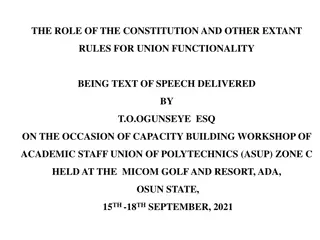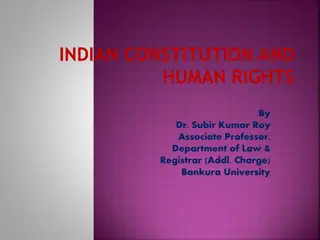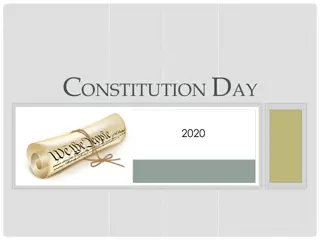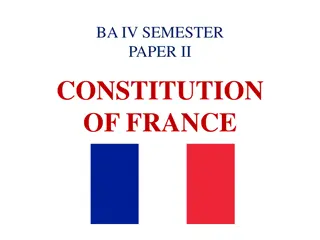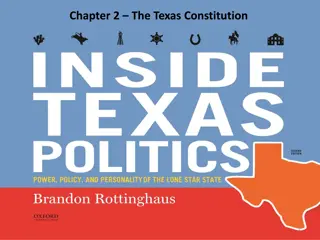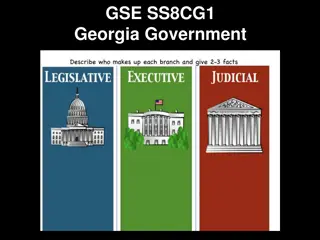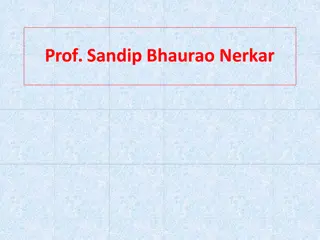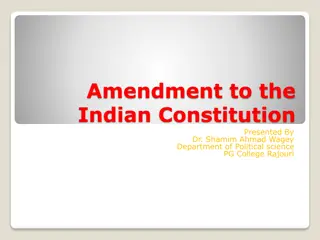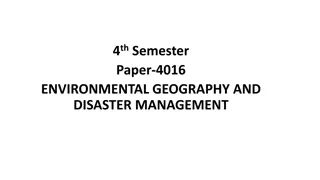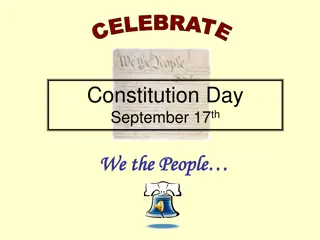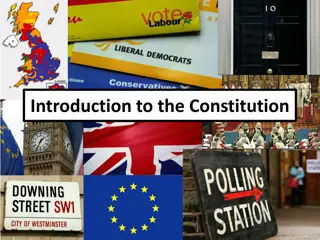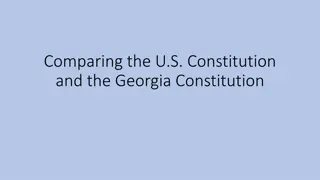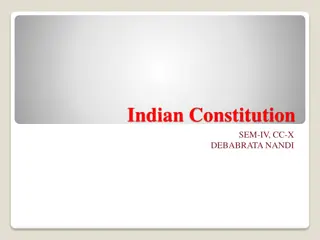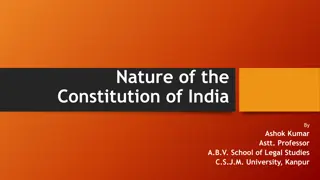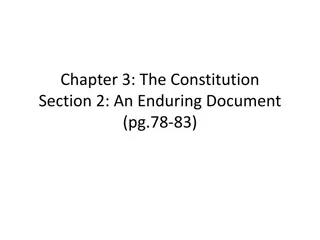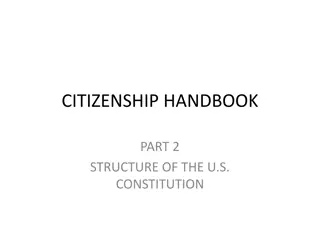Understanding Emergencies in the Indian Constitution
Dr. Babasaheb Ambedkar described the Indian Constitution as both federal and unitary, transitioning to complete unitary during crises. The Constitution allows for National, State, and Financial emergencies. Article 352 deals with National Emergency, where the President can proclaim it in case of war, external aggression, or armed rebellion. Impact includes central government dominance and special powers. State Emergency under Article 356 focuses on protecting states from internal issues or failure of constitutional machinery.
Download Presentation

Please find below an Image/Link to download the presentation.
The content on the website is provided AS IS for your information and personal use only. It may not be sold, licensed, or shared on other websites without obtaining consent from the author. Download presentation by click this link. If you encounter any issues during the download, it is possible that the publisher has removed the file from their server.
E N D
Presentation Transcript
Introduction According to Dr Babasaheb Ambedkar, The constitution of India is federal as well as unitary. But at the time of crises, it becomes the entire unitary system. There are three types of emergencies in Indian constitution National Emergency State Emergency Financial Emergency
1. National Emergency Article 352 of the constitution of India deals with the National emergency. The President of India has the power to proclaim the national emergency. If the president satisfied that there is a threat to the security of India or external aggression then the president proclaims the national emergency. This power to proclaim the emergency is not like the president merely on the advice of PM can proclaim an emergency. It is necessary that the Prime minister of India must communicate in writing about an emergency to the president. There are three grounds on which president of India can proclaim emergency.
War External aggression Armed rebellion BEFORE the 44 th amendment president had the power to proclaim the emergency on the ground of internal disturbance but the 44th amendment replaced that word and insert armed rebellion to ensure the abuse of emergency power. However, in 1988 article 352 of the constitution of India again amended and allowed the president to proclaim the emergency on the ground of internal disturbance. But After that, it was repealed by the 63rd amendment of the constitution of India and this amendment clearly says that the emergency in this article can only be issued on above mentioned three grounds. In India, there are four times when the president proclaimed emergency under Article 352 At the time of the china war on 26 October 1962. Pakistan war in 1971. On 25 June 1975 on the ground of internal disturbance. Results of the National emergency
Proclamation of emergency made extraordinary changes in administration. as the executive and legislature of the union become more powerful than the state. For instance, the emergency government of India can give a direction to the state on any matter. Under the emergency, Parliament may extend the period of the house of people for one year at a time. In the emergency, Parliament has the power to legislate on the matters which are given in the State list. President of India may suspend the division of taxes between the state and the unions and granting aids to them. Impact on the relationship between the center and the country. The executive power is completely in the hands of the central government. The state can be directed to any subject; the legislature authorizes the center to legislate on the matters included in the state list.
2. State Emergency Article 356 of the constitution of India deals with the state emergency. It is the duty of the central government to protect the state and union territories from external aggression, internal disturbance. it is the duty of the central government to ensure that the state is complying with the provisions of the constitution of India. if the state is failed to comply with the constitution then the president of India proclaims the state emergency in that particular state. Failure of constitution machinery is the main reason for the state emergency. According to Article 356 of the constitution of India, the president of India can proclaim state emergency either by the report of the government or if President satisfied that the state government failed to work in accordance with the constitution of India.
In a state emergency, except the judicial system, the union government has complete control over the state. When analyzing previous state emergencies, three general reasons mentioned in Article 356 can be determined: a disorder of public order, political instability, corruption, and poor governance. In Rameshwar Prasad vs Union Of India It was held that the President s statement regarding the dissolution of the Bihar State Assembly under Article 356 violated the Constitution on irrelevant grounds. The court stated that the governor misled the center by recommending the dissolution of the state assembly. .
Effect of State emergency The effect of proclamation of the state emergency under Article 356 of the Constitution of India shall be as follows President of India may declare that the state will run under the authority of parliament and parliament will get power to make laws which are given under state list. During the proclamation of emergency, the President of India may make such provision which appears to him necessary to fulfil the object of proclamation. President of India may suspend the operation of any Constitutional provision relating to anybody or authority in the State. Judiciary will work independently in a state emergency. Supreme court of India and High court can strike down the emergency which proclaims under Article 356 which is based on malfide or irrelevant material
3. Financial Emergency Article 360 of the Constitution of India gives authority to the president of India to proclaim the financial emergency. However, so far there is no proclamation of financial emergency that has been done. Article 360 of the Constitution of India provides that is the president of India satisfied that there is a threat to the financial stability of India or of any part of the territory of it then he may proclaim the emergency. Duration of financial emergency is of continuance two months after two months from the date of proclamation it will automatically cease. During a Financial emergency, president may issue directions for the reduction of salaries and allowances of all. However, it also includes the judges of the supreme court and high court
The Union government can instruct the state to comply with certain financial regulations. The President has the power to reduce the salaries and allowances of all kinds of persons, including the judges of the Supreme Court and the high Courts. The Union may ask states to reduce the salaries and allowances of all civil servants in connection with the affairs of the state. So far there has been no financial emergency in the country.







